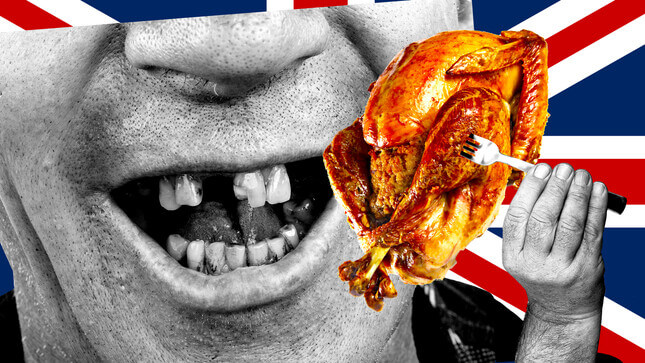Why Do Brits Love Thanksgiving?
The Discourse

There were more than 758,000 British people in the United States in 2013, more than the populations of the four least populous states and the District of Columbia. They’re bloody everywhere.
One of those British people is Paul Crosbie, Splinter writer Jack Crosbie’s father, and another one of them is Splinter’s Libby Watson. Both Paul and Libby absolutely love Thanksgiving, which seems like a pattern. So—why do British people love Thanksgiving so much? We decided to investigate.
Jack: My father came to the U.S. when he was about my age—late twenties—because he met my mom on a backpacking trip and then decided not to leave. He took to certain aspects of it immediately, and as far as I know his favorite parts about being a naturalized American are getting to drive a pickup truck and having Thanksgiving. Because he’s currently at my house for the holiday, I asked him what was up with the latter. He grunted “no cultural baggage,” and then muttered about “Christmas and Easter and all that” being very much tied up with the Church and British Tradition.
My mother interjected that Thanksgiving certainly has cultural baggage for Americans, what with the legacy of brutal colonialism and mistreatment of Native peoples. Part of my hypothesis is that the Brits are, by necessity, pretty good at ignoring legacies of brutal colonialism, and my father made the point that homeland Brits don’t really feel responsible for the sins of the early American settlers from various European nations. Thanksgiving is on us. Regardless, my dad pointed out that he was mostly talking about how Thanksgiving is a rare secular holiday, which is nice. “I like that I get to spend time with my family without any other British cultural context. Plus I enjoy eating good food—you get the idea.”
My parents’ oldest friend, Gillean Wilson, is another Brit transplant to the U.S. who’s been here for decades. I asked her what she thought of the holiday and got perhaps the most British response possible: “I’m not opposed to it,” she said. “It’s just an extra holiday. It’s a good celebration just for getting together, but otherwise I can leave it, it’s just another day. But extra holiday, that’s good. Pragmatism, I suppose.”
I’ve also got three cousins in America this year for their first Thanksgiving: Ryan, Nathan, and Jay. As they haven’t experienced a Thanksgiving yet, they can’t quite comment on the general trend, but all three seem very excited about the prospect. They did have some questions, most of which related to the quantity and presentation of the food. Ryan asked, “Will the mac and cheese also be homemade? (Yes.) “How many dishes will there be?” (Lots). Nathan wanted to know how many meats there would be, “Because typically on Christmas, Jack, we have three meats.” I told him he was a greedy bastard and that we usually have one meat on Thanksgiving but that in many households it’s not uncommon to have two (we’ll be having two this year, as a friend is smoking a pork shoulder). If the cousins say anything profound after Thanksgiving I’ll update this blog.
Libby: I am British and have lived in America for six years, and Thanksgiving is routinely one of the best days of the year. I got married this year so I finally have real family to spend the day with, but I have many happy memories of Thanksgivings past, when friends have invited me into their families’ homes, even putting me up for the night in a different city, always with warmth and generosity, and always treating me like part of the family. More than anything, though, I love getting time off, because work is bad. (The part of Thanksgiving that is least forgivable is the treatment of retail and restaurant workers who have no choice but to work that day. Best Buy does not need to be open. No one needs a $40 HDMI cable on Thanksgiving.)
I asked some other British friends in the U.S.—yes, we do all know each other—and some of them were ambivalent, though these friends all live in New York, which might have something to do with it; one suggested that “everyone’s kitchen is too tiny to cook the right Thanksgiving food so we all end up getting Chinese.”
Ed Zitron, a Londoner who now lives in the Bay Area, said he is “the big boy” and loves “his big treats,” and in that respect Thanksgiving is good because it’s “a genuinely warm and nice time for everyone to eat as much as they want.” Like me, he has happy memories of many Thanksgivings in the U.S. with friends and their families, saying, “people will just invite you into their home,” unlike in Britain. He also noted, correctly, that in Britain the only Big Meal we get is Christmas, which is “more restrained” than the “excess” of Thanksgiving here.
Mikey Franklin, who lives in Washington, D.C., said he loves Thanksgiving because it has “all of the genuinely nice warm-and-fuzzies of Christmas, but none of the consumerism or Christianity.” This, too, is true. Of course, British Christianity is a lot less extra than American Christianity; for most Brits Christmas is not about Christ at all. “Christ who?”, we say, as we munch through an entire tin of Quality Street. But Thanksgiving is thoroughly not religious. It is about family, friends, and food. That’s it.